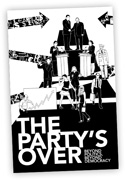New Pamphlet: Beyond Democracy!
 international |
arts and media |
other press
international |
arts and media |
other press
 Wednesday October 08, 2008 13:35
Wednesday October 08, 2008 13:35 by gav corcaigh. - scs.
by gav corcaigh. - scs.

THE PARTY'S OVER, a comprehensive guide to the indignities of representative democracy and an introduction to some of the radical alternatives.
CrimethInc. operatives have labored over various versions of this text for more than eight years, and we’re excited to present what we consider to be the definitive edition. Those familiar with earlier versions will be glad to see new sections of text and plenty of new artwork.

Download the pamphlet:
(for online reading) http://thecloud.crimethinc.com/pdfs/democracy_reading.pdf
(for printing out) http://thecloud.crimethinc.com/pdfs/democracy_imposed.pdf
The next few weeks should offer ample opportunities to distribute these everywhere people are unsatisfied with their current options and groping for something better. Here follow a few quotations from the text.
"Representative democracy is similar to capitalism in that everyone supposedly gets a chance, but only a few come out on top. If you didn’t win, you just didn’t try hard enough! This is the same rationalization that capitalists use to justify the injustices of capitalism, sexism, and racism: look, you lazy bums, you could have been Bill Cosby or Hillary Clinton if you’d just worked harder."
"By confining political participation to the isolation of the voting booth, the democratic system prevents people from learning how to wield power and work out conflicts collectively. Consequently, political conflicts can be framed as disagreements between people within the same economic classes, rather than between the classes themselves."
"In contrast to forms of decision-making in which everyone’s needs matter, the disempowerment of losers and out-groups is central to democracy. It is well known that in ancient Athens, the 'cradle of democracy,' scarcely an eighth of the population was permitted to vote, as women, foreigners, slaves, and others were excluded from citizenship. This is generally regarded as an early kink that time has ironed out, but one could also conclude that exclusion itself is the most essential and abiding characteristic of democracy: millions who live in the United States today are not permitted to vote either, and the distinctions between citizen and non-citizen have not eroded significantly in 2500 years. Every bourgeois property owner can come up with a thousand reasons why it isn’t practical to allow everyone who is affected to share in decision making, just as no boss or bureaucrat would dream of giving his employees an equal say in their workplace, but that doesn’t make it any less exclusive. What if democracy arose in Greece not as a step in Man’s Progress Towards Freedom, but as a way of keeping power out of certain hands?"
"Ultimately, the most transparent democratic political process will always be trumped by economic matters such as property ownership. Even if we could convene everyone, capitalists and convicts alike, in one vast general assembly, what would prevent the same dynamics that rule the marketplace from spilling over into that space? So long as resources are unevenly distributed, the rich can always buy others’ votes: either literally, or by promising them a piece of the pie, or else by means of propaganda and intimidation. Intimidation may be oblique—'Those radicals want to take away your hard-earned property'—or as overt as the bloody gang wars that accompanied electoral campaigns in nineteenth century America."
[...and one longer selection:]
"Sometimes a candidate appears who says everything we've been saying to each other for a long time—he seems to have appeared from outside the world of politics, to really be one of us. By persuasively critiquing the system within its own logic, he subtly persuades people that the system can be reformed—that it could work, if only the right people were in power. Thus a lot of energy that would have gone into challenging the system itself is redirected into backing yet another candidate for office, who inevitably fails to deliver.
"But where do these candidates—and more importantly, their ideas and momentum—come from? How do they rise into the spotlight? They only receive so much attention because they are drawing on popular sentiments; often, they are explicitly trying to divert energy from existing grass-roots movements. So should we put our energy into supporting them, or into building on the momentum that forced them to take radical stances in the first place?
"More frequently, we are terrorized into focusing on the electoral spectacle by the prospect of being ruled by the worst possible candidates. 'What if HE gets into power?' To think that things could get even worse!
"But the problem is that the government has so much power in the first place—otherwise, it wouldn’t matter as much who held the reigns. So long as this is the case, there will always be tyrants. This is why it is all the more important that we put our energy into the lasting solution of opposing the power of the state."
 international |
arts and media |
other press
international |
arts and media |
other press
 Wednesday October 08, 2008 13:35
Wednesday October 08, 2008 13:35 by gav corcaigh. - scs.
by gav corcaigh. - scs.

























 printable version
printable version

 Digg this
Digg this del.icio.us
del.icio.us Furl
Furl Reddit
Reddit Technorati
Technorati Facebook
Facebook Gab
Gab Twitter
Twitter